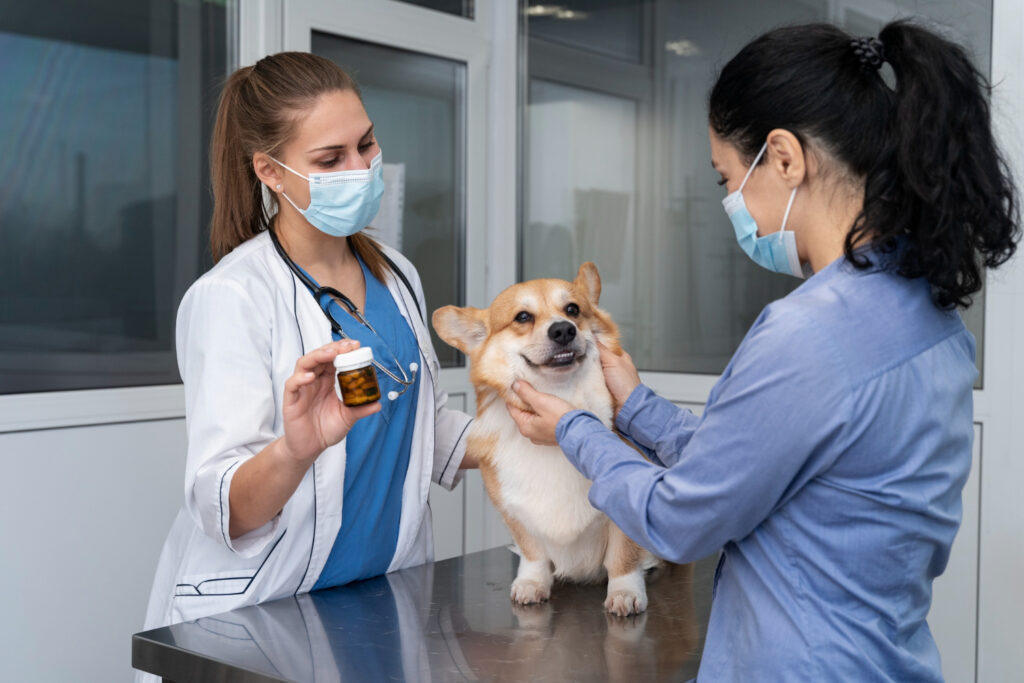Veterinary Course
A veterinarian degree covers a wide range of subjects, from animal anatomy to pharmacology, and thus prepares students for employment in animal health and medicine. It combines academic study with real-world application, including hands-on training with animals. Consequently, students gain essential knowledge in performing surgeries, managing veterinary clinics, and diagnosing and treating a variety of animal illnesses. Additionally, topics such as microbiology, pathology, and clinical skills are usually included throughout the course. As a result, graduates might work as researchers, veterinary technicians, or veterinarians. Overall, their training equips them to handle the complexities of animal health and advance the field of veterinary science.

Veterinary Medicine
Veterinary medicine focuses on diagnosing, treating, and preventing diseases and injuries in animals. It encompasses various aspects including:
- Clinical Practice: Involves examining and treating animals, conducting surgeries, and providing preventive care. Veterinarians may work in private clinics, animal hospitals, or shelters.
- Specializations: Veterinarians can specialize in fields like surgery, dermatology, internal medicine, dentistry, or exotic animal care.
- Research: Veterinary researchers work on developing new treatments, understanding animal diseases, and improving veterinary practices.
- Education: Veterinarians typically need a Doctor of Veterinary Medicine (DVM) degree from an accredited veterinary school, followed by licensing.
- Public Health: Veterinarians play a role in zoonotic disease control (diseases that can be transmitted from animals to humans) and ensuring food safety.
- Preventive Medicine: Includes vaccinations, parasite control, and health check-ups to prevent diseases.
Veterinary medicine is crucial for animal health and welfare, and it also impacts human health through the management of zoonotic diseases and food safety.
Veterinary Medicine Degrees
Bachelor’s Degree:
- Pre-Veterinary Studies: Often a prerequisite for admission to veterinary school. This degree includes coursework in biology, chemistry, and animal science.
- Bachelor of Science in Animal Science: Focuses on animal biology, health, and management.
Doctor of Veterinary Medicine (DVM) or Bachelor of Veterinary Medicine and Surgery (BVMS):
- DVM: The primary degree required to become a licensed veterinarian. It includes comprehensive training in animal health, surgery, pharmacology, and diagnostics.
- BVMS: Similar to the DVM, commonly used in some countries, like the UK and Australia.
Master’s Degree:
- Master of Science (MS) in Veterinary Science: This degree may be pursued for research, teaching, or specialization in a specific area of veterinary course.
- Master of Public Health (MPH) with a focus on Veterinary Medicine: Combines veterinary medicine with public health principles.
Ph.D.:
- Doctor of Philosophy (Ph.D.) in Veterinary Science: For those interested in advanced research or academic careers in veterinary medicine.
Specialized Residencies and Diplomas:
- Residency Programs: Provide advanced training in specific fields like surgery, dermatology, or internal medicine.
- Diplomas from Veterinary Colleges: Offered by various veterinary specialty boards, such as the American College of Veterinary Internal Medicine (ACVIM).
Continuing Education and Certification:
- Board Certification: Veterinarians can earn board certification in various specialties after completing additional training and passing exams.
Each of these degrees and programs prepares individuals for different roles within the field of veterinary course, from clinical practice to research and teaching.
Veterinary Medicine training

Pre-Veterinary Education:
- Undergraduate Studies: Students typically complete a bachelor’s degree in a related field such as animal science, biology, or pre-veterinary studies. Coursework includes subjects like biology, chemistry, physics, and animal anatomy.
Veterinary School:
- Doctor of Veterinary Medicine (DVM) or Bachelor of Veterinary Course and Surgery (BVMS): This program usually lasts 4 years. It covers core subjects such as:
- Basic Sciences: Anatomy, physiology, microbiology, and pharmacology.
- Clinical Sciences: Diagnosis, surgery, internal medicine, and emergency care.
- Preventive Medicine: Vaccination, nutrition, and parasitology.
- Practical Experience: Hands-on training through clinical rotations in various specialties, including surgery, internal medicine, and emergency care.
Internship (optional):
- Clinical Internship: A 1-year program providing advanced clinical training in a specific area of veterinary medicine. It helps build experience and skills before pursuing specialization.
Residency (for specialization):
- Specialized Training: For those aiming to become specialists in fields like dermatology, surgery, or cardiology. Residencies typically last 3-4 years and involve intensive training and research.
Licensing and Certification:
- Licensing Exam: After completing veterinary school, graduates must pass a national licensing exam (such as the NAVLE in the US) and possibly a state or regional exam, depending on the location.
- Board Certification: Optional but recommended for those pursuing specialization. This involves passing rigorous exams and demonstrating expertise in a particular area of veterinary medicine.
Continuing Education:
- Ongoing Training: Veterinarians must engage in continuing education to stay updated with the latest advancements in veterinary course, new technologies, and changes in regulations.
Professional Development:
- Workshops and Seminars: Attending professional development events helps veterinarians enhance their skills and knowledge.
This structured training ensures that veterinarians are well-equipped to provide high-quality care for animals, engage in research, and contribute to advancements in the field.


